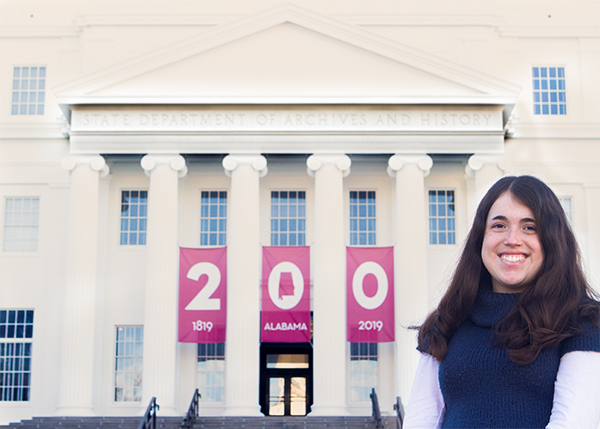Student Spotlight: How Sophie Howard Found Her Way to SIS and Archives

Featured student: Sophie Howard
Location: Birmingham, Alabama
Current job: Appraisal archivist at the Alabama Department of Archives and History, in Montgomery, Ala.
Family: My mother and father have always encouraged me to find a career and life that makes me happy, and I feel they have encouraged me throughout this process because they can see that my career is making me very happy now. I’m also grateful to my boyfriend and his family, because they’re also supportive of me during this time.
Why SIS?: How I got here is pretty convoluted. When I first was going to undergraduate school (at Murray State University in Kentucky) I had a five-year plan. I was going to get my degree in a foreign language, maybe Japanese, and the go abroad. Then there was illness in my family, and I am an only child, so I realized that, maybe being halfway around the world wasn’t the best idea. So I changed to an international studies degree. When I graduated, I got a job at the Alabama Department of Commerce as a trade specialist, and while I liked the job, something was missing. I found out about information sciences, and then I learned about all the career paths, and since I didn’t know what I wanted to do, I liked that there were a lot of options. I liked being able to take the classes I needed to for my future career. I was actually interviewing for my current job while I was in the application process for the master’s program, and I got the job before I started the program. I feel really fortunate to have the opportunities I’ve had, even though I’m young, and that I get to work in my field while I’m in graduate school.
Why UT?: I was looking for a program that was in the southeastern United States, partially because I knew I had to make some trips to campus. That was part of it, but when I was able to shortlist my schools and I started speaking with professors at each campus, I spoke to Dr. Kelly and found her to be a really warm person who seemed excited for me to be a part of the program. I just felt like we had a really good connection, and the professors I talked to were great, too.
Pathway: When I applied and they were asking me about what career track I wanted to do, I had no idea, but I love my job and learning about archival practices, and I have taken the archives courses that SIS offers. I intend to stay where I’m at for the foreseeable future. I’m really happy with my career and my degree should allow me some opportunities for advancement. I think the fact that I was starting the information science degree program during my interview process might have been a point in my favor, so hopefully having the diploma in my hand will look good, too.
Distance Education: It’s great to be able to pursue an online degree, especially considering that I’m at a different time in my life than I was previously. There aren’t any information science degrees that I could attend in-person in my area. I don’t really feel like the quality of the education itself suffers by being at a distance. You don’t notice it that much because the classes are synchronous. A lot of online classes are asynchronous, but synchronous makes you feel like you’re there.
How has your experience been at UT?: With the graduate teaching assistantship, it’s been really cool. Working with Dr. Zhu last year was great – I got to see how that process works, how papers get published, how many different steps go into research before you get to the final interview. It was very interesting. Dr. Zhu is my adviser and I love her to death and she’s been wonderful and I’ve taken several classes with her and I could sing her praises all day.
Because of the GTA opportunity, I was able to more easily afford graduate school, which is another thing I’m very grateful for. All in all, I do think there are definitely accommodations in place for people that need a little help affording the program.
This year I was paired with Dr. Potnis for the entire academic year and it’s wonderful to work with him because of his interest in access to technology in third world entries. In the Archives, Alabama has a lot of rural technology access issues – areas of our state that don’t have as much access to internet and wifi. The Archives does outreach to those communities, making sure they have the same opportunities for their local government records needs as bigger cities do.
Challenges: My biggest challenge certainly is balancing school, my work and my other commitments. I have a lot of caregiving responsibilities, so it can be difficult to make sure I’m fulfilling obligations in all the areas of my life. I think everyone says this, but it is really important to make sure you take time for yourself as well. I have run into situations when I have dedicated so much time to the care of others that I haven’t taken care of myself, and when that happens, I become less efficient. That’s a critical component of success. But powering through it is also part of it.